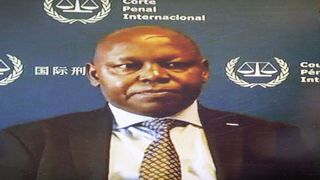
Kenyan lawyer Paul Gicheru makes his first appearance before the ICC on November 6, 2020, before Judge Reine Adélaïde Sophie Alapini-Gansou of Pre-Trial Chamber A.
| Pool | AFPPolitics
Premium
Paul Gicheru’s surrender to ICC could be a blessing in disguise for Ruto
What you need to know:
- Being haunted by the court, Dr Ruto played victim, mobilised around patriotism and sovereignty and got a huge sympathetic following.
- The patriotism card is also a major strategy for any politician facing the court.
Ordinarily, being accused of committing crimes against humanity should be a public relations nightmare for a leader. But the surrender of lawyer Paul Gicheru to the International Criminal Court (ICC) following indictment over witness tampering in the case facing Deputy President William Ruto could be a blessing in disguise for him as he trains his sight on the presidency in 2022. Especially, if 2013 case is anything to go by.
The ICC cases brought together President Uhuru Kenyatta and Dr Ruto, who were in rival political camps, during the disputed 2007 presidential vote, whose result sparked violence and the subsequent ICC intervention.
Mr Kenyatta was in the then President Kibaki’s PNU team and Dr Ruto in Mr Raila Odinga’s ODM. The fierce contest between the two men led to their naming in December 2010 by then ICC Prosecutor Luis Moreno-Ocampo among six individuals alleged to bear the greatest responsibility for the 2008 post-election violence.
Conspiracy
Being haunted by the court, Dr Ruto played victim, mobilised around patriotism and sovereignty and got a huge sympathetic following.
If Dr Ruto were to be dragged into the case facing Mr Gicheru, he could use the card of “conspiracy against me by the system and dynasties”. Despite being a wealthy man, the DP has fashioned himself as a hustler, an outsider who is disliked by the political elite because he does not come from a famous family. The DP has also come out to claim that the system is against him and such charges can reinforce that narrative, if for some reason he may have to return to the ICC.
“Our supporters already feel that Ruto is a victim of the Deep State because he is being persecuted locally. If the ICC comes for him again, he would appear to be a victim of Raila’s machinations. Raila was the presidential candidate in 2007, not Ruto. That is what happened to Uhuru in 2013,” said Mathira MP Rigathi Gachagua, who was President Kenyatta’s personal assistant when he was indicted by ICC in 2011.
Tribulations
Dr Ruto could cite Mr Odinga as the man behind his ICC tribulations by claiming, as he did in 2013, that he was not on the ballot in the disputed 2007 election and it is Mr Odinga who ratted him out. Mr Odinga has denied such charges. That could work for regions like Mt Kenya, which was made to believe that Mr Odinga pushed for Mr Kenyatta’s arraignment at the ICC so he could inherit Kibaki’s seat. Mr Odinga denied such accusations. The patriotism card is also a major strategy for any politician facing the court. ICC is perceived as foreign court run by US and Europe.
“Our people do not like taking orders from foreign masters,” said lawyer and political activist Stephen Mbugua. In Mt Kenya, that could invoke Mau Mau spirit against colonialism, a liberation strategy that was used well in 2013 by the Uhuru camp.
In 2013, the two used the ICC tribulations to drill a message of reclaiming the country’s sovereignty from “colonial masters”. Their messaging was helped by an earlier warning from the UK High Commissioner in Nairobi Christian Turner, who said that Britain would avoid all but essential contact with indictees.
Dr Ruto could also use the ICC card to foster high voter turnout by fashioning the election as a way for his supporters to save him from his persecutors.
But Mr Mbugua warns that the 2013 plan may only work if the State does not cooperate with the ICC.





